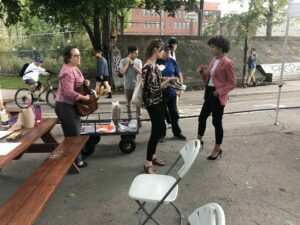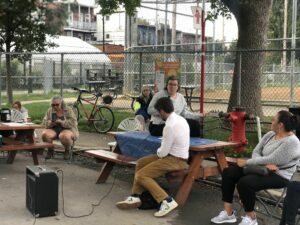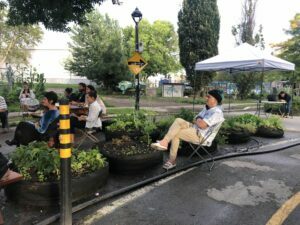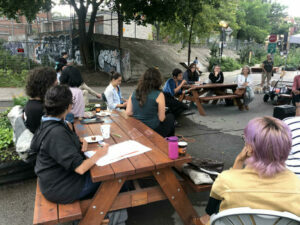Eat Think Vote in Laurier-Ste-Marie — in a nutshell!


By Sylvie Chamberland, Co-Executive Director of Carrefour Alimentaire Centre-Sud, with the participation of the Food Secure Canada
On Thursday, September 9, in partnership with Food Secure Canada, Carrefour alimentaire Centre-Sud (CACS) organized and coordinated an Eat Think Vote event for the second time. The Carrefour alimentaire Centre-Sud’s mission is to improve access to healthy food for all and to support local, ecological and solidarity-based food systems. Therefore, ensuring that the various parties integrate social justice issues into their platforms is a priority for the organization.
In 2020, the health crisis highlighted the food insecurity that affects over 4.4 million Canadians. Since the pandemic, the number of people affected by food insecurity is now 1 in 7. The riding of Laurier Ste-Marie is no exception and the population has been greatly affected by the health crisis. Many low-income workers have lost their jobs and food aid resources have worked tirelessly to ensure that the population has access to healthy food. It was therefore important for CACS to discuss these issues and to let the citizens speak.
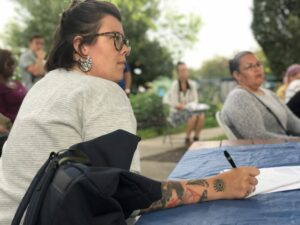
In the magnificent setting of the Promenade des saveurs, the largest edible street in Canada, the event brought together some thirty passionate participants and three of the committed candidates of the Laurier-Sainte-Marie riding; Steven Guilbeault of the Liberal Party, Nimâ Machouf of the New Democratic Party (NDP) and Marie-Êve-Lyne Michel of the Bloc Québécois.
The candidates defended some of the concrete policies put forward by their respective parties, and shared their wishes, personal anecdotes and experiences under three different themes: universal school feeding, causes and solutions to food insecurity, and sustainable and local food systems. Here is a summary of the positions and ideas discussed under each theme.
After Danie Martin presented the work and advocacy of the Coalition for Healthy School Food, the question was simple: Will you support the universal school food program?
Nimâ Machouf, NDP, mentioned that food is only part of the problem; we need to fight poverty. School food is a gateway to many things like education, health, food insecurity, etc. She therefore agreed to support this type of program.
Marie-Eve-Lyne Michel, Bloc: She also agreed: “We work for Quebec first and foremost, but what is good for Quebec is good for the rest of Canada.” (quote translated from french) She told an anecdote about poverty and recalled the importance of education on food. Schools are for her the gateway to raising awareness among young people.
Steven Guilbeault, Liberal, also agreed and brought back that the Liberals have demonstrated this in their commitment on their electoral platform to a school feeding policy. However, he indicated that there is some resistance from the provinces. He recalled that, for the carbon tax, the federal government had to go to the Supreme Court against the provinces to have it adopted. He hopes that this will not be the case for a school food program.
What do you know about the situation in the neighbourhood schools?
Nimâ Machouf, NDP, related the fact that many of the schools in the neighbourhood have lost the school food program due to the gentrification of the neighbourhood. Community organizations are a large part of the social safety net and are underfunded.
Steven Guilbeault, Liberal, would like to see a federal plan for all of Canada because he knows that some children do not eat at school, but education is a provincial jurisdiction. At the moment, the Liberals are in discussions with the provinces. He also talked about funding for bio-food infrastructure funds to support community organizations in their activities.
The Bloc responded that the experts were in Quebec City and that education should be funded by the province.
What would you do to improve food insecurity?
Marie-Êve-Lyne Michel of the Bloc Québécois is banking on very affordable social housing, but also on a review of the employment insurance program. For the Bloc, it is essential to increase the number of weeks to 50 for workers who are sick in order to protect them and their families from poverty.
Nimâ Machouf, NDP, advocates for an increase in the minimum wage to $20/hour. Social housing is also an important issue for the party, which should include the construction of 110,000 housing units over the next 10 years, as well as the renovation of existing units. Facilitating access to property is also a key. Access to public health programs, including eye and dental care, is essential.
Steven Guilbeault, Liberal, also spoke about housing, noting the 10 projects that are currently underway in the riding. He argued that programs for seniors and benefits for parents are concrete actions to fight poverty. He mentioned the importance of moving towards a circular economy without waste and investing in innovation.
Do you support a guaranteed minimum income?
After deflecting the question, both the Bloc Québécois and the Liberal Party responded that it is up to the province to set up this type of program. According to Guilbeault, it is difficult to evaluate a minimum amount for all the provinces in Canada, which do not necessarily have the same realities. Machouf of the NDP stated that she was in favour, citing the example of Finland, which has implemented such a measure. According to her, it is a matter of human dignity. If the government was able to do it for the ECP, why not for a guaranteed minimum income?
In a country like Canada, how can we have access to healthy, local food at affordable prices?
Marie-Êve-Lyne Michel of the Bloc Québécois: “We need to rethink our agriculture, think about research.” For the party, we must increase the production of organic food and ban neonicotinoids. We need a greener agriculture and proximity as well as more production in greenhouses. Promoting agri-tourism is a key to improving the lot of farmers, she said.
Nimâ Machouf, NDP, also stated the importance of thinking about incentives to increase access to local products. Will this require a tax on products that come from too far away? One thing is certain for her, it will take subsidies.
Steven Guilbeault, Liberal supports the federal government to increase subsidies to produce more local and organic products. He agrees to work together for food autonomy.
How will you reduce food waste?
Steven Guilbeault, Liberal, highlights initiatives to recover waste and put it to good use. He gives the example of a company in the Eastern Townships that has succeeded in recovering food waste from ICIs to make high-value insect flours. According to him, it is essential to stop food waste with innovative initiatives.
An hour and a half to talk about food issues and the fight against poverty is not enough time to go in depth into the subject and talk concretely about the possibilities. Nevertheless, it is a good start and an appetizer to help participants make a decision in their voting choice. It is also an opportunity to meet the future candidate of the riding in order to present them with some of the concerns of the neighbourhood.
For its part, the Carrefour alimentaire Centre-Sud strongly encourages candidates to support the Local Community-Based Farm Card, or Carte proximité program and petition 3384 which has been submitted to the Government of Canada for food stamp programs. The Carte proximité is a system that allows the population to have access to fresh and healthy food while supporting local farmers. This year, more than $325,000 was distributed, reaching 1,400 households living with food insecurity in the Montreal area. From the very first year, the Carte proximité has helped increase the consumption of fruits and vegetables by nearly one serving per day, which is a major effect, according to the experts consulted.
And now it’s your turn to vote, because everyone needs to eat! To find out where to vote, visit the official election website.
Sylvie Chamberland is the Co-Director General at Carrefour Alimentaire Centre-Sud. You can read the article on the Carrefour Alimentaire Centre-Sud website here (in french).
